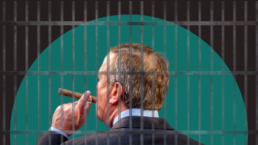The other side of criminal justice reform is focusing on white-collar prosecutions.
By Alvin Bragg and Zephyr Teachout, The Nation
There have been 13 deaths at Rikers Island this year already, while white-collar criminals rarely even get ankle bracelets as they await trial. This month, as the Chamber of Commerce amped up its campaign to stall legislation that would hold the Sackler family accountable for the deaths they caused and profited from by encouraging the over-prescribing of opioid drugs, a poor man in a wheelchair was killed by Covid. He’d been charged with gun possession and became the 13th Rikers’ death because he couldn’t afford $100,000 bail.
Two criminal justice systems, separate and unequal, means we don’t have justice. One criminal justice system is for the wealthy and well-connected, where prosecutors and judges hesitate, negotiate, and, if they even think about bringing criminal charges, are tempted to settle. The other is for poor Black, brown, and vulnerable communities where even before a trial you can be sent to a death trap like Rikers. In 2018, fewer than 40 people employed by major corporations got prison time for any federal white-collar crime, while nearly 20,000 people were federally sentenced for drug crimes. More people went to Rikers yesterday than were ever charged with causing the financial crisis.

What that means is that we need two kinds of reform: Along with ending mass incarceration, retooling prosecutorial practices and incentives, and reducing sentence length, we also need to dial up our white-collar prosecutions. The failure to stop theft, abuse, and suffering at the hands of criminals with spreadsheets and fancy systems of fraud is directly leading to impoverished communities and fewer resources for public investments. It’s also leading to a crisis for the rule of law.
Recent Posts
‘Unconstitutional. Unethical. Authoritarian.’ ICE Bars Millions Of Immigrants From Bond Hearings
July 18, 2025
Take Action Now One watchdog said the new policy “seems like a blatant attempt to stop them from exercising their right to due process.”……
Americans Are Not Nearly Alarmed Enough About Climate Change
July 18, 2025
Take Action Now Americans still don’t comprehend how imminent, dangerous, and far-reaching the threat is—and journalists are partly to blame.By…
The IRS Is Building A Vast System To Share Millions Of Taxpayers’ Data With ICE
July 17, 2025
Take Action Now ProPublica has obtained the blueprint for the Trump administration’s unprecedented plan to turn over IRS records to Homeland Security…
Israel’s Sudden Assault On Syria Is Unchecked Aggression
July 17, 2025
Take Action Now Jerusalem is bombing Damascus and threatening al-Sharaa’s rule, while Washington was hoping to help the nascent government on…




